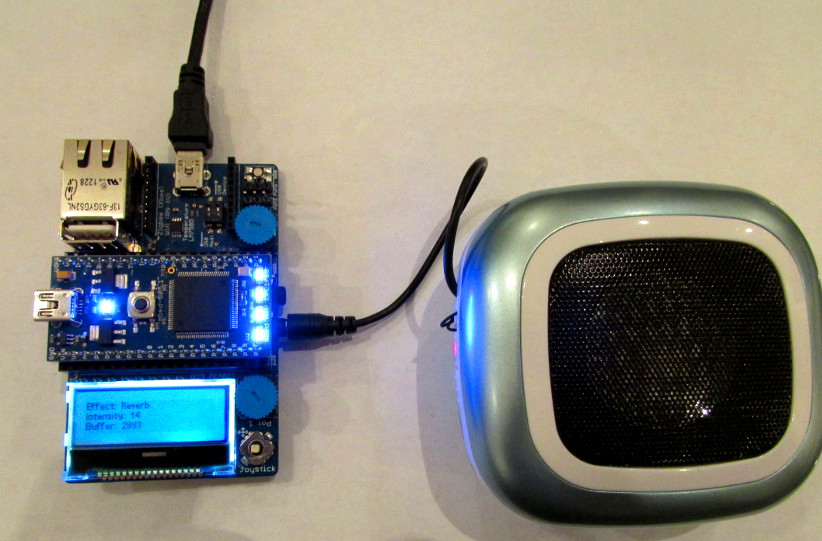Streams USB audio with sound effects applied. Sound effect selected by joystick and intensity altered by tilting the mbed. Output to the mbed-application-board phono jack.
Dependencies: C12832_lcd MMA7660 USBDevice mbed

/* Uses the mbed LPC1768 and mbed-application-board to create a USB audio device * that streams audio from a host computer to headphones or powered speakers. * A couple different sound effects can be applied to the stream in real-time, * and tilting the mbed alters intensity of the effect. * * ECHO * The joystick selects ) | * one of three effect ) STRAIGHT - o - STRAIGHT * modes. ) | * REVERB * * * * \\ || * Tilting the mbed ) ====== \\ || * determines intensity ) \\ || * of the effect. ) * 0% 50% 100% * * The LCD display shows the current effect mode, intesity and buffer level. */
Diff: effects.cpp
- Revision:
- 0:bbf6cf0eab95
--- /dev/null Thu Jan 01 00:00:00 1970 +0000
+++ b/effects.cpp Thu Mar 27 21:27:04 2014 +0000
@@ -0,0 +1,147 @@
+/*******************************************************************************
+ * Module processes 16-bit audio samples to produces delay-based sound effects.
+ * Bryan Wade
+ * 27 MAR 2014
+ ******************************************************************************/
+#include "mbed.h"
+#include "effects.h"
+#include "delay.h"
+
+// Delay based effects require significant RAM, so we must
+// scavange two banks of RAM that mbed has reserved for ethernet:
+// AHBSRAM0: 0x2007C000 - 0x2007FFFF (16KB)
+// AHBSRAM1: 0x20080000 - 0x20083FFF (16KB)
+// To keep the linker happy we allocate the RAM with a 16KB array in each bank,
+// but since they are contiguous, we can treat them as one 32KB block.
+static const int RAM_BANK0_SIZE = 16 * 1024;
+static const int RAM_BANK1_SIZE = 16 * 1024;
+__attribute((section("AHBSRAM0"),aligned)) char ramBank0[RAM_BANK0_SIZE];
+__attribute((section("AHBSRAM1"),aligned)) char ramBank1[RAM_BANK1_SIZE];
+
+static effect_mode_t effectMode;
+static uint16_t effectGain;
+static const int MAX_DELAYS = 7;
+static delay_t *delay[MAX_DELAYS];
+
+static void initializeEcho(void);
+static void initializeReverb(void);
+
+/*
+ * Initialize module.
+ */
+void Effects_Initialize(void)
+{
+ effectGain = 0;
+
+ // Create all the delay objects. They will be initialized and
+ // re-initialized as needed each time the mode changes, but the
+ // total number of delay objects is fixed.
+ for (int i = 0; i < MAX_DELAYS; i++)
+ {
+ delay[i] = Delay_Create();
+ }
+ Effects_SetMode(EFFECT_STRAIGHT);
+}
+
+/*
+ * Apply current effect to sample stream.
+ * @return Processed sample.
+ */
+int16_t Effects_ProcessSample(int16_t dataIn)
+{
+ int16_t dataOut;
+
+ switch (effectMode)
+ {
+ case EFFECT_ECHO:
+ dataOut = Delay_WriteWithFeedback(delay[0], dataIn, effectGain);
+ break;
+
+ case EFFECT_REVERB:
+ dataOut = (Delay_WriteWithFeedback(delay[0], dataIn, effectGain) +
+ Delay_WriteWithFeedback(delay[1], dataIn, effectGain) +
+ Delay_WriteWithFeedback(delay[2], dataIn, effectGain) +
+ Delay_WriteWithFeedback(delay[3], dataIn, effectGain) +
+ Delay_WriteWithFeedback(delay[4], dataIn, effectGain) +
+ Delay_WriteWithFeedback(delay[5], dataIn, effectGain) +
+ Delay_WriteWithFeedback(delay[6], dataIn, effectGain)) / 7;
+ break;
+
+ case EFFECT_STRAIGHT:
+ default:
+ dataOut = dataIn;
+ }
+
+ return dataOut;
+}
+
+/*
+ * Getter/setters.
+ */
+void Effects_SetMode(effect_mode_t mode)
+{
+ // Ignore if already in desired mode.
+ if (effectMode == mode) return;
+
+ // Effects_Process() will continue to be called by an ISR while
+ // changing modes, so first change to straight mode since this
+ // can safely play at any time. Then change to the desired mode
+ // once it is fully configured.
+ effectMode = EFFECT_STRAIGHT;
+
+ switch (mode)
+ {
+ case EFFECT_ECHO:
+ initializeEcho();
+ effectMode = mode;
+ break;
+
+ case EFFECT_REVERB:
+ initializeReverb();
+ effectMode = mode;
+ break;
+
+ case EFFECT_STRAIGHT:
+ default:
+ effectMode = mode;
+ }
+}
+
+void Effects_SetGain(uint16_t gain) { effectGain = gain; }
+
+/*
+ * Configure one large delay for echo.
+ */
+void initializeEcho(void)
+{
+ // The maximum echo delay is 16K samples since each sample is 2 bytes
+ // and we have 32KB available.
+ static const int ECHO_DELAY_SAMPLES = 12000;
+ Delay_Configure(delay[0], (void *)ramBank0, ECHO_DELAY_SAMPLES * sizeof(int16_t));
+}
+
+/*
+ * Configure all delays for reverb.
+ */
+void initializeReverb(void)
+{
+ // Delay lengths are chosen as a base length times prime numbers to prevent
+ // interfernce patterns. Total size of all delay lines must fit within 32KB.
+ static const int REVERB_BASE_DELAY_SAMPLES = 256;
+ static const int PRIMES[MAX_DELAYS] = {2, 3, 5, 7, 11, 13, 17};
+
+ char *ram = ramBank0; // Location for first buffer.
+
+ for (int i = 0; i < MAX_DELAYS; i++)
+ {
+ // Configure each delay with proper buffer size and location
+ int size = PRIMES[i] * REVERB_BASE_DELAY_SAMPLES * sizeof(int16_t);
+ Delay_Configure(delay[i], (void *)ram, size);
+
+ // The next buffer location immediately follows this one.
+ ram += size;
+ }
+}
+
+
+
\ No newline at end of file